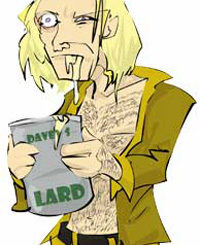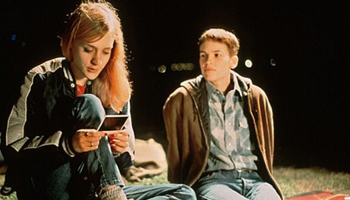 Oscar Race 2000
Oscar Race 2000
by Christian T. Escobar
When summer is over and Hollywood is finished making its money, things in movieland start to get serious. It’s usually around Labor Day that the Oscar race begins, and it doesn’t come to a stop until all the snow has melted. This Holiday-season/Oscar-race had its ups and downs and saw a lot of premiere filmmakers release new films, some of them wildly successful, others of embarrassingly flimsy quality. Like most recent years, the independent scene generated the most exciting and refreshing pictures, but Hollywood managed to throw together some first-class product themselves.
It’s easy to begin with what I felt was the Best Picture of 1999, and that is David O. Russell’s sublime socio-political war picture Three Kings. Taking place during the Gulf War, Russell’s quiet, underlying themes of violence and foreign policy say more about our country and our ideology then any film in a long time. War and violence-related films came and went throughout the season, such as the bloated Anna and the King and the irreverent Shakespearean adaptation Titus. The latter being an interesting blend of time-periods and provocative ideas. But perhaps the most documented film dealing specifically with violence was David Fincher’s one-two punch combination of testosterone and existential quest, Fight Club. With fierce performances from both Edward Norton and Brad Pitt, it was one of the year’s most provocative films.
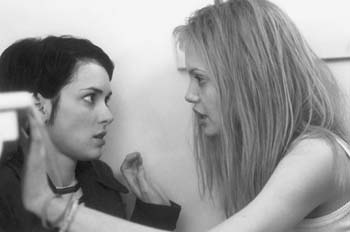 By the time Halloween rolled around, Blair Witch fever died down and The Sixth Sense madness nearly vanished, Hollywood had another round of so-called spooky thrillers to force feed us. Whether it was Stigmata, Stir of Echoes, or The House on Haunted Hill, none displayed a scintilla of originality. There was hope for Tim Burton’s darkly vibrant take on Sleepy Hollow, but those hopes were trampled when, despite the gorgeous visuals, the story was as hollow as that infamous covered bridge. Later in the year, Arnold Schwarzenegger tried to catch on to the edgy, religious creepshow trend with End of Days. It may actually have been the end of his career. And finally, Wes Craven brings his juvenile scary trilogy to an end with Scream 3. We may all rejoice.
By the time Halloween rolled around, Blair Witch fever died down and The Sixth Sense madness nearly vanished, Hollywood had another round of so-called spooky thrillers to force feed us. Whether it was Stigmata, Stir of Echoes, or The House on Haunted Hill, none displayed a scintilla of originality. There was hope for Tim Burton’s darkly vibrant take on Sleepy Hollow, but those hopes were trampled when, despite the gorgeous visuals, the story was as hollow as that infamous covered bridge. Later in the year, Arnold Schwarzenegger tried to catch on to the edgy, religious creepshow trend with End of Days. It may actually have been the end of his career. And finally, Wes Craven brings his juvenile scary trilogy to an end with Scream 3. We may all rejoice.
There were a few films for kids, the biggest being the cult-like phenomenon, Pokemon. I’m not quite sure who’s my favorite, Pikachu or Meowto. On a more sensible note, Pixar released its pleasantly entertaining sequel Toy Story 2. You have to throw praise at a film that parents can enjoy as much as their children do. Too often, mothers and fathers spend the hour and a half sleeping or wishing they were in Bermuda.
Women had their moments in this season’s assemblage, with perhaps the fiercest and boldest achievement coming from Hillary Swank. Swank burst through with a tour-de-force performance in Kimberly Pierce’s true-life Boys Don’t Cry. Yes, the film also features Chloe Sevigny at her best, but Swank’s role as the sexually confused Teena Brandon is perhaps the best of the season and the year. French actioneer Luc Besson tried desperately to make a star out of super-babe Milla Jovovich in The Messenger, but she’s much more convincing in her Revlon commercials than she is as Joan of Arc. In the spunky but fragile Anywhere But Here, director Wayne Wang pulls two fine and relevant performances from Susan Sarandon and Natalie Portman. The film itself is syrupy and the polar opposite of gritty, but it’s solid enough to pass for real life. James Mangold, best known for the overstuffed Copland, takes Susanna Kaysen’s touchy-feely memoir, Girl, Interrupted, about her time spent in all-girl mental lockup, and delivers a touchy-feely film version. Despite a strong, yet unoriginal performance by Angelina Jolie, the picture rarely takes a solid bite out of its premise.
Angela’s Ashes, helmed by the versatile – if not hit or miss – Alan Parker, takes depression from the pages of a book to lushly and inexorably deliver the audience into tears. Not exactly the most enjoyable movie experience, but with Emily Watson leading a strong cast, the tragedies are desperately genuine and involving. Flamboyant Spanish director Pedro Almodovar had his finest moment with All About My Mother, clearly the most emotionally satisfying picture of his career. Cecilia Roth, the emotional center of the film, wears her heart on her sleeve throughout and not once does it seem insincere or contrived. Jane Campion brought poignancy to its pinnacle with The Piano, but with the contentious Holy Smoke she fails once again to suitably use her unique ability to galvanize a particular subject. Then there is Michael Apted, who may be best known for attempting to present powerful female characters. Since his failure rate was astronomical, he gave up on his womanly tirades and tried helming a James Bond picture. The World Is Not Enough once again takes Pierce Brosnan, a couple of hot babes, and, with laser-guided precision, places them between explosions and sex scenes.
This year was a big one for established directors unveiling new works of art. Mike Leigh returned with an out-of-character period piece comedy Topsy-Turvy. Leigh’s flexibility, gift for dialogue, and knack for drawing out terrific performances from his actors will probably always give him a good finished product. And despite troubles with the law, Oliver Stone returned with his silly football epic, Any Given Sunday. A flashy style, absolutely zero substance, and no cooperation from the NFL made his insider-epic foolish and cartoonish. And speaking of out-of-character, try David Lynch’s transcendent story of a man and his lawnmower in The Straight Story. How many directors could make a simple and enchanted tale about an old man driving his lawnmower across two states? And even if they did, would they cast Richard Farnsworth, who turned in a marvelously subtle piece of acting? Neil Jordan’s The End of the Affair continues his string of lustful and Dionysian romances. With his biographical Man on the Moon, Milos Foreman reaches into the life of Andy Kaufman and thrusts Jim Carrey into a tremendous performance in an otherwise nettlesome picture. Kevin Smith finally found someone to release his fustian yet enjoyable Catholic comedy Dogma. My question is “What on Earth was the knee-jerk fuss all about?” Anthony Minghella, whose first picture, The English Patient, ate up Academy Awards, delivered a devilishly delicious adaptation of The Talented Mr. Ripley. Tempered with shades of Hitchcock, it’s Matt Damon’s finest work. As great as Philip Seymour Hoffman is (and he is great), he still couldn’t lift Joel Schumacher’s Flawless out of the celluloid dumpster. Schumacher makes Ed Wood look like Orson Welles. Danny Boyle, whose success with Trainspotting put him smack-dab in the middle of the pop culture map, has stumbled twice since. First with the inexcusably bad A Life Less Ordinary, next and more recently with his under-whelming and shallow adaptation of The Beach, which will probably best be known as the movie that had Thailand’s panties in a bunch. Sports movie specialist Ron Shelton jumped in the ring again with his flaky boxing comedy Play It To The Bone, whose finest quality may be the appearance of Lucy Liu. Perhaps Shelton should avoid the sport of boxing, since his other pugilist film The Great White Hype was equally as stodgy.
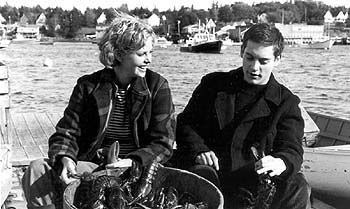 In more serious tones but staying in the same ring, Norman Jewison’s stark and moving story of the life and times of wrongfully imprisoned boxer Rubin Carter in The Hurricane contains one of the finest performances of the year from Denzel Washington. Washington also showed up in The Bone Collector, directed by Philip Noyce, Hollywood’s standard for run-of-the-mill action-adventure. This movie succumbed to cliched temptations, but is still recommended thanks to the ever-angelic Angelina Jolie. Woody Allen also dropped in his requisite film for the year with the ingenuous jazz picture, Sweet and Lowdown. Like most recent Allen movies, this one features killer turns from its performers (namely Sean Penn), but still doesn’t measure up to the Allen of old. Martin Scorsese returned to the silver screen with his steamy, percolating life and death drama Bringing Out The Dead. Unfortunately, it seems as if Scorsese has lost his once golden touch. In my opinion, he is the finest director of his generation, but despite a string of good films, he hasn’t put out a rapturous picture since GoodFellas.
In more serious tones but staying in the same ring, Norman Jewison’s stark and moving story of the life and times of wrongfully imprisoned boxer Rubin Carter in The Hurricane contains one of the finest performances of the year from Denzel Washington. Washington also showed up in The Bone Collector, directed by Philip Noyce, Hollywood’s standard for run-of-the-mill action-adventure. This movie succumbed to cliched temptations, but is still recommended thanks to the ever-angelic Angelina Jolie. Woody Allen also dropped in his requisite film for the year with the ingenuous jazz picture, Sweet and Lowdown. Like most recent Allen movies, this one features killer turns from its performers (namely Sean Penn), but still doesn’t measure up to the Allen of old. Martin Scorsese returned to the silver screen with his steamy, percolating life and death drama Bringing Out The Dead. Unfortunately, it seems as if Scorsese has lost his once golden touch. In my opinion, he is the finest director of his generation, but despite a string of good films, he hasn’t put out a rapturous picture since GoodFellas.
The two most fascinating films have little in common with the exception of two brave directors. Magnolia is the brainchild of P.T. Anderson. It consists of a myriad of characters whose sad and sorry lives all find a way to intersect at one point or another. Thematically, the picture drives itself with biblical, sexual, and social undertones. The film itself is far from perfect (or even wholly enjoyable), but it’s a remarkable attempt at storytelling with a fresh approach. The most original film of the season (and 1999) comes from music video veteran Spike Jonze. Being John Malkovich is the type of movie that a lot of people just won’t like. It’s intellectual without being pompous. It’s stylish without being flamboyant. It’s funny without being outlandish. It’s the type of film that truly emphasizes the term “independent” in all contexts. Not just due to budget, but because Jonze’s style and story are truly original and independent.
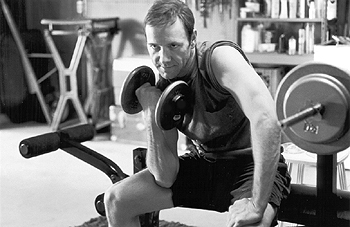 Then there are the five Academy award nominees for best picture. The Academy darling, which has been the critics darling, has not been my darling. American Beauty is the type of film most critics love. It has top-notch performances from its actors, it has a contemporary flair, and it deals with a subject matter entrenched in today’s headlines. And that’s my issue with the film itself. It’s too late. Those who are shocked by the film’s version of American dysfunction are either being quixotic or they’re clearly not in touch with reality. In this age of tabloid television and news magazines parading the bizarre events going on in small town America, nothing should be surprising anymore. The film has numerous winning qualities, but it’s essentially a hollow and empty tale that has more self-importance than actual importance. The Green Mile is the second film from director Frank Darabont, the first being the masterful gem The Shawshank Redemption. Both films deal with the strength of the human spirit, but this time around there’s a little bit of the supernatural to help out. The splendor of this film is essentially based in the balancing act Darabont must master between the miracle and the message. My biggest problem with the film is that it falls back on character manipulation to help forward its message, which is in part about the injustice of the death penalty. Last year, the country became obsessed with The Sixth Sense. And rightfully so. It’s an amazing picture that surprised even the most astute film-goer. I’ll admit that the little kid who whispers his every line drives me up the wall, but I give credit where credit’s due – he pulls off his role with ease. But clearly the credit for this film has to go to writer/director M. Night Shyamalan, who elevated cleverness (if not manipulation) to an all-new level. I don’t know if it’s Best Picture material, but it may’ve been the most enjoyable film of the year. When I saw Michael Mann’s scathing recreation of the behind-the-scenes events of “60 Minutes” in The Insider, it was a stark reminder of how powerful the media has become in our country. If a story isn’t told on “60 Minutes,” it finds its way to the magazines, and if that doesn’t reach enough people, they package it up into one of our most accessible art forms (the motion picture) and that’s sure to get the story across. It’s an important issue, and the Tobacco companies deserve to be buried for what they’ve done, but somehow the film doesn’t resonate as strongly as I would’ve liked. It’s a good film, with a phenomenal performance from Russell Crowe, and a significant issue worthy of notice, yet, there’s something missing that I can’t quite put my finger on. Out of the five nominees, there’s no doubt that The Cider House Rules is the Best Picture of the bunch. Few films can take on so many subject matters, so many subtextual ideas, and so many emotions, and not find themselves lost or losing focus. Director Lasse Hallstrom not only keeps control, he delivers an emotional film partly about ideals without once seeming sanctimonious. Yes, there’s a clear Pro-Choice message threaded throughout the film, but it transcends that singular issue for something greater. The main character, after all, is not Pro-Choice. There’s something to be said of those who try to make rules for other people’s lives without walking a step in their shoes. This film says it clearly.
Then there are the five Academy award nominees for best picture. The Academy darling, which has been the critics darling, has not been my darling. American Beauty is the type of film most critics love. It has top-notch performances from its actors, it has a contemporary flair, and it deals with a subject matter entrenched in today’s headlines. And that’s my issue with the film itself. It’s too late. Those who are shocked by the film’s version of American dysfunction are either being quixotic or they’re clearly not in touch with reality. In this age of tabloid television and news magazines parading the bizarre events going on in small town America, nothing should be surprising anymore. The film has numerous winning qualities, but it’s essentially a hollow and empty tale that has more self-importance than actual importance. The Green Mile is the second film from director Frank Darabont, the first being the masterful gem The Shawshank Redemption. Both films deal with the strength of the human spirit, but this time around there’s a little bit of the supernatural to help out. The splendor of this film is essentially based in the balancing act Darabont must master between the miracle and the message. My biggest problem with the film is that it falls back on character manipulation to help forward its message, which is in part about the injustice of the death penalty. Last year, the country became obsessed with The Sixth Sense. And rightfully so. It’s an amazing picture that surprised even the most astute film-goer. I’ll admit that the little kid who whispers his every line drives me up the wall, but I give credit where credit’s due – he pulls off his role with ease. But clearly the credit for this film has to go to writer/director M. Night Shyamalan, who elevated cleverness (if not manipulation) to an all-new level. I don’t know if it’s Best Picture material, but it may’ve been the most enjoyable film of the year. When I saw Michael Mann’s scathing recreation of the behind-the-scenes events of “60 Minutes” in The Insider, it was a stark reminder of how powerful the media has become in our country. If a story isn’t told on “60 Minutes,” it finds its way to the magazines, and if that doesn’t reach enough people, they package it up into one of our most accessible art forms (the motion picture) and that’s sure to get the story across. It’s an important issue, and the Tobacco companies deserve to be buried for what they’ve done, but somehow the film doesn’t resonate as strongly as I would’ve liked. It’s a good film, with a phenomenal performance from Russell Crowe, and a significant issue worthy of notice, yet, there’s something missing that I can’t quite put my finger on. Out of the five nominees, there’s no doubt that The Cider House Rules is the Best Picture of the bunch. Few films can take on so many subject matters, so many subtextual ideas, and so many emotions, and not find themselves lost or losing focus. Director Lasse Hallstrom not only keeps control, he delivers an emotional film partly about ideals without once seeming sanctimonious. Yes, there’s a clear Pro-Choice message threaded throughout the film, but it transcends that singular issue for something greater. The main character, after all, is not Pro-Choice. There’s something to be said of those who try to make rules for other people’s lives without walking a step in their shoes. This film says it clearly.

